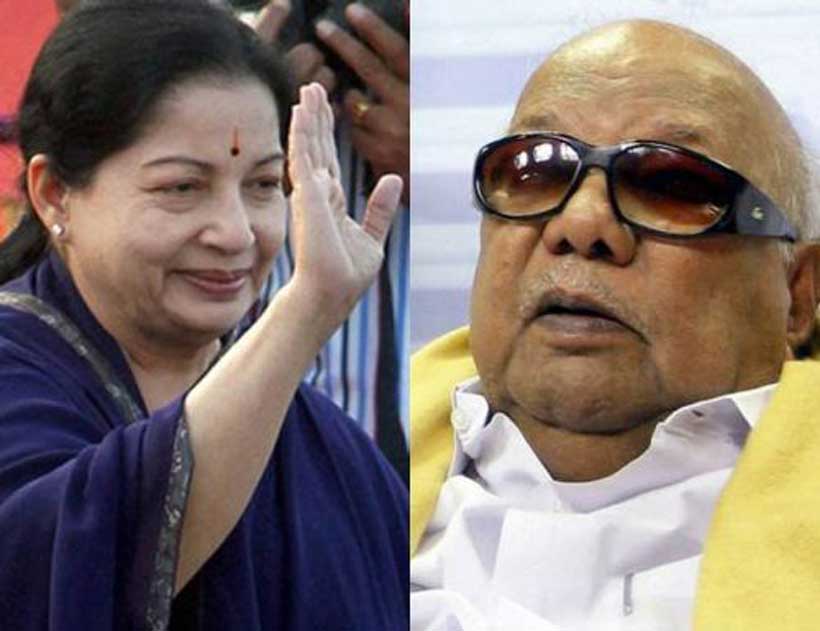Authors: Srimal Fernando and Harini Jayaraman
For over half a century the politics of the Indian state Tamil Nadu was dominated by the popular figures Muthuvel Karunanidhi and Jayalalithaa Jayaram .What kept this political scenario unchanged for so long was the dominance of their respective parties Dravida Munnetra Kazhagam (DMK) and All India Anna Dravida Munnetra Kazhagam (AIADMK). In this context the whole hearted acceptance of Karunanidhi’s and Jayalalithaa’s policies for progression by the vast majority of the people created a favourable political atmosphere over the years. These leaders’ populist reformist policies swept across the state impacting the narrowing down of inequalities. There has been a re-alignment in the political identity of state due to the influence of policies implemented by these leaders. They had a distinct rural flavour. Since the inception of Indian Independence in 1947,minimal attention has been given towards state upliftment in Tamil Nadu. Tamilians’ strong sense of state identity and affiliation is what has helped them overcome these challenges. In the recent past Tamil Nadu moved up to the fourth position in Human Development Index(HDI) ranking in 2011 and being first among Indian states in economic development in 2015 reflects on the work carried out by the populist leaders over the years.
Looking back on the political history after the demise of Annadurai, one of the founding members of DMK it was clear that Karunanidhi had to fulfilled the visionary policies of his mentor during his political journey. The veteran leader first came to power as the chief minister in 1969 . One of his political missions centred around socio-economic reforms through the implementation of welfare schemes. During his tenure, he gave the underprivileged sections of the society an access to state sponsored homes and introduced schemes where they could gain free access to commodities. Another milestone in his welfare policies was called the ‘Nalamana Tamizhagam’ that was mandated to educate people on ways to prevent non-communicable diseases. In addition , crores of rupees was allocated to provide financial aid to pregnant women from the poorer strata of the society during his previous chief ministership. Hence, de-regulating the farmers’ market helped eliminate middle men and get fairer prices for farmer’s products raised the profitability of the agricultural sector. However, improvements in the irrigation facilities boosted the domestic agrarian sector. This resulted Karunanidhi getting elected as chief minister of Tamil Nadu five times between 1971to 2018.
By mid 1980s after MG Ramachandran’s death the loyalist faction headed by Jayalalithaa was recognized by AIADMK. In 1990s,in contrast to the DMKs party positioning AIADMK under the leadership of Jayalalithaa started to create in-roads into state politics. For the first time in 1991 when AIADMK came to power Jayalalithaa’s party received more than 225 seats in the Tamil Nadu elections. In fact five years later the two time chief minister Karunanidhi did particularly well in Tamil Nadu politics receiving 221 seats. Under the leadership of Jayalalithaa she performed three main functions in the political process from 1984-2016.Jayalalithaa first became the chief minister in 1991.Jayalalithaa created history in Tamil Nadu politics by emerging the winner of two elections in a row; once in 2011 and once in 2014.Firstly,she implemented poverty alleviation schemes as well as infrastructural measures .Secondly, as a chief minister her welfare schemes provided laptops for students and canteens with subsidized food which was known as ‘Brand Amma’. Thirdly, state provisions of 300 units of free electricity for villages was a success and reduction of power cuts was a praiseworthy initiative launched during her tenure. Hence closing down of liquor taverns across the state and introducing ‘the cradle baby scheme’ were highly admirable social justice programmes that was carried out during the veteran leader’s period. Therefore , the launching of 2300 projects costing an estimated amount of Rs 5000 crores contributed to the state level economic growth.
The two individuals have clashed in several lively debates in state assemblies. Both have earned praise for implementation of successful state centric policies. These leaders represented a period of dynamic change. The competition between both their parties for political power has continued over a period of three decades. Jayalalitha and Karunanidhi believed the change for socially and economically backward sections of the society in the state could come only if they were helped by powerful reforms programmes to achieve change within a system. These charismatic leaders left behind a legacy that cannot be easly matched by other state level political leaders in the modern history of Tamil Nadu politics. They created a revolution that completely transformed states political, economic and social landscape. Their sad demise has shaken the Tamil Nadu society. Karunanidhi and Jayalalithaa have left a void in state politics and also in national politics . Hence, it is expected in the near future that this voice left by these political leaders can only be filled in by Tamil Nadu politicians with strong impactful visions who follow the principles ,the values and the policies laid down by Karunanidhi and Jayalalithaa.
* Harini Jayaraman, a scholar of Masters in Diplomacy, Law, Business at Jindal School of International Affairs, India and has attained a Bachelor of Science degree in Psychology from University of Madras.


